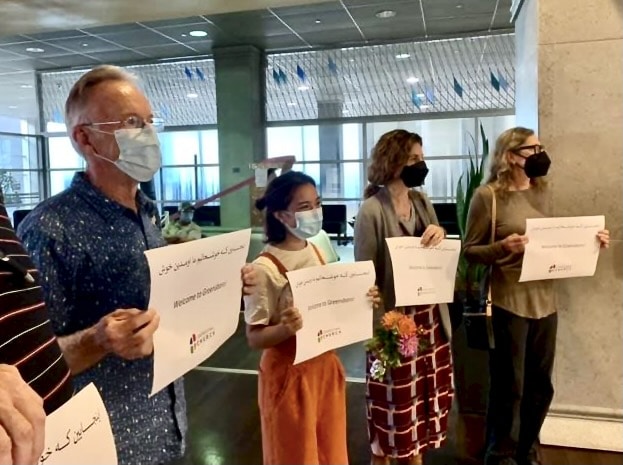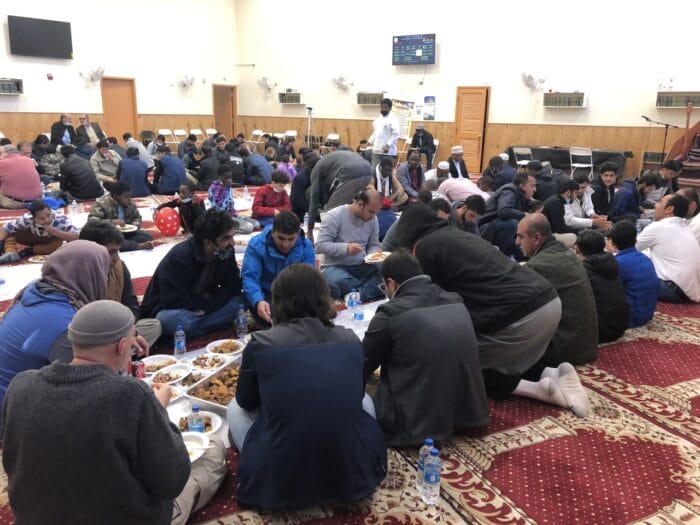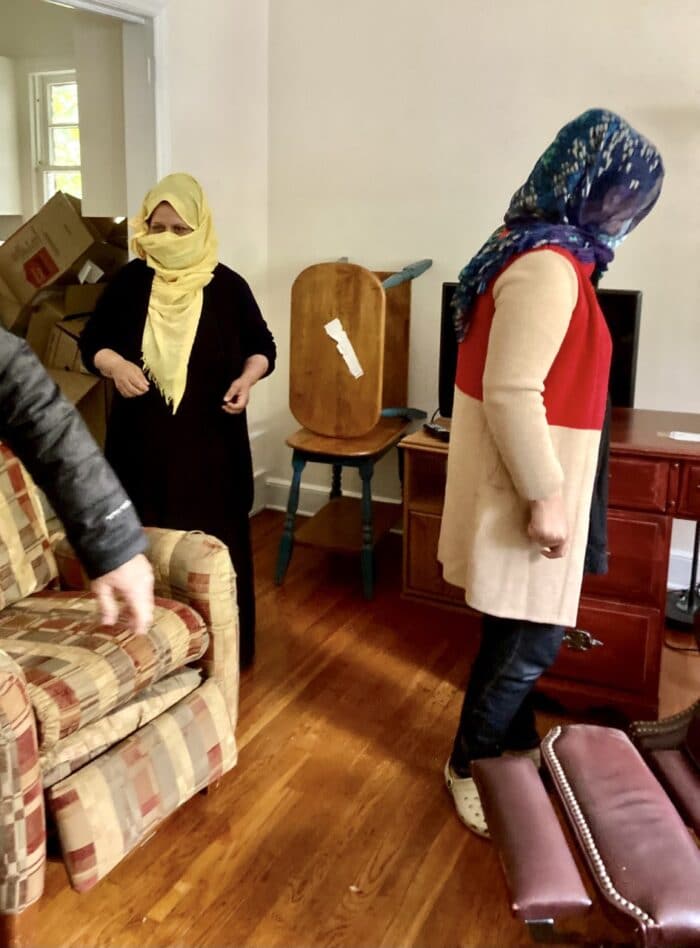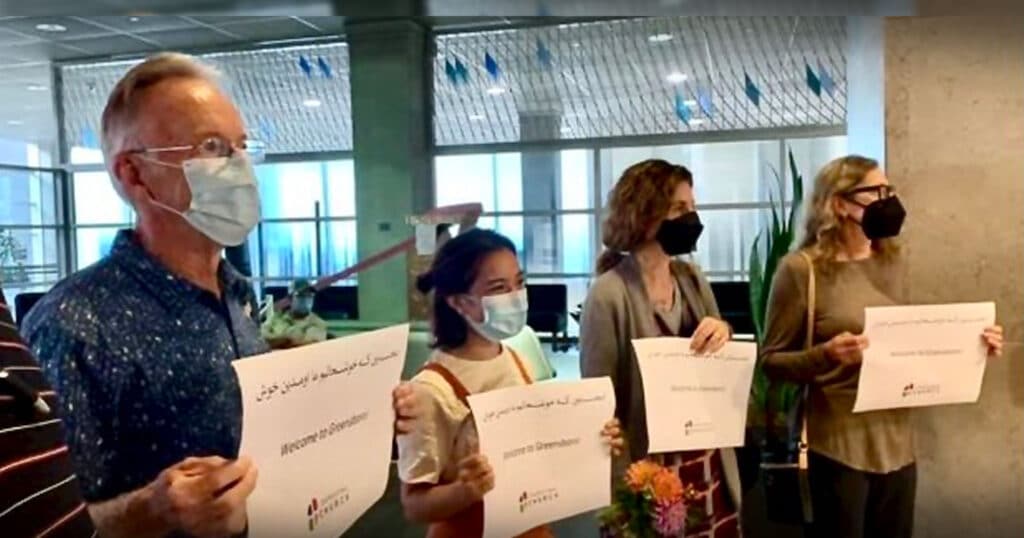Greensboro church takes in two refugee families
Welcome the stranger. Love your neighbor. A Greensboro, N.C., congregation has put much time, talent and treasure into that ministry over the last five years.
Congregational United Church of Christ has taken in two families fleeing Afghanistan in the last four months. The church, led by the Revs. Julie Peeples and Paul Davis, has moved from offering sanctuary to undocumented immigrants, which the church has done twice, to resettling refugees – those they can sponsor and those they can offer support.

“The first family we are sponsoring arrived in early October,” said Peeples, the church’s senior pastor. “The second family arrived in December and had been living in the church sanctuary rooms where immigrant families previously stayed. Another UCC church, Mt. Hope in Whitsett, has agreed to take on their sponsorship with our support, which is wonderful.”
Team of 45
Greensboro church members Steve Tate and Katherine Rowe are coordinating efforts with the Afghan families. “They have been amazing and have gone way beyond the call of duty,” Peeples said.
Tate, a relative newcomer to Congregational UCC, was looking for a way to deepen his connection to his church family. Rowe, a recent empty-nester, wanted to do something meaningful with her spare time. They, along with veteran Capri Burchett, have found the families housing, employment and a way through the bureaucracy that setting up a new life entails.

They work with a team of 45 volunteers that Congregational UCC calls Afghan Allies. Tate and Rowe divided people into interest teams to handle shopping, medical appointments, schooling, employment, social events, and scheduling.
The first family, called “our family” by Tate and Rowe, consists of parents who are in their early 50s, and children ages 17 to 25: two sons, two daughters. They arrived Oct. 10, 2021. Rowe, who renovates houses and sells them for a living, found them a place to rent by December. “They are living in the middle of a real American neighborhood, in a three-bedroom house. They can catch the bus. We’ve talked to the neighbors and they’ve been really kind.”
The men all have jobs and the girls are in school. Tate, a retired businessman who sold his goat cheese dairy farm, understood the importance of securing employment for “our family,” so he took that on. He also tackled scheduling.
Dividing up the work
“Steve was really good at realizing that a family needs to get going financially and bureaucratically before they can learn and look at social and civic engagement,” Rowe said. In their “divide and conquer” system, she set up medical appointments.

Burchett, the third member of the leadership team, handled the legal visits and the bureaucracy. “She took them to HHS and Social Security, got them their Medicaid cards and set up their accounts,” Rowe said. Burchette also helped support their spiritual grounding, handling the Mosque runs on Fridays, for 13 weeks in a row.
Tate said that there were some days several volunteers were tapped at the same time, involved in taking individual family members on a number of runs to different appointments.
“It’s like tag-team wrestling,” Rowe said. “Whenever one of us was spent, we could tag out and let the others take over.” Tate said, “We really do have good communication amongst the three of us. There are checks and balances on how we set boundaries. The three of us worked well together.”
Rowe compared it to building a nest for “their” family. “I am surprised. It’s taken so much more time than I realized – I wanted to do something meaningful after my last child moved out. You really have to start building a life for this new family.”
‘Your generosity encourages me’
“Words cannot explain how appreciative we are of Allah’s mercy,” wrote the oldest son of the Congregational UCC effort. “When we left Afghanistan, not only did we leave our career, but we left all our life and what we considered our independence. I as the elder son … have to admit that sometimes I feel like giving up, however first and foremost I have to remember that Allah is still in control.
‘Second, I have to remember what I’ve been through, why I’m here and know that I have full support of my family and people of the Congregational United Church of Christ who care enough and are able to donate funds to people like me and my family who struggle more than the average person realizes.
“Words are not enough to express how grateful and happy I felt (and still feel) when I was informed that we had been sponsored. It has been a challenge and an extra burden for you all. Your generosity encourages me not only to continue to be hopeful through hurdles, but also to continue on my path as a future sponsor and helper to others in need.”
They now help others
He’s already giving back, Peeples said. When the second family arrived Dec. 14, he and his brother helped welcome them, assuring the frightened and exhausted mother and her five children they would be okay.
“In one of numerous powerful moments,” she said, “two grown sons from the first family joined us in greeting the second family at the airport, serving as translators and assuring the new arrivals, ‘you are safe now. These are good people, and you are safe.’”
Congregational’s pastors and the resettlement organizers knew they couldn’t take on the financial sponsorship of the second family, but they could offer them space in the church basement where former immigrants had lived in sanctuary.
Despite that, Rowe and Tate both talked about the moment just before they went down to greet the newcomers. “We met at the top of the stairs, looked at each other,” Tate said. “We know what is going to happen if we go down there,” Rowe said. “We went down there and fell in love with those people and we couldn’t let them sit there without getting them the services they deserve.”
Tate said pastor Julie told the congregation that they couldn’t fully sponsor a second family while still working with the first one – but they could all work to find sponsors for them. Peeples was in the process of contacting a number of other churches when Mt. Hope stepped up.
A month later, “Mt. Hope dove right in,” Tate said. “They just took over and the transition went really smoothly.”
Second family of 6
Mt. Hope’s family is another family of six, a mother and five children, ages 17 to 30: three girls, two boys. The father died not too long before they left Afghanistan. “Just an hour ago, they moved into their own house,” said Tate on Jan. 27. “They are still on the bus route, a little farther than five miles from Congregational, 14 miles from Mt. Hope.”
Church members are now concerned about giving attention to a group of 14 single Afghan men, placed in a house not far away without a sponsor, or other aid. The Congregational team is trying to help supply some basic needs for them.
“When we look back on this time, we’ll realize that what really happened – there was a tsunami and we got our toes in the water when water wasn’t very high,” Tate said. Congregational UCC’s family was the first or second group of Afghan refugees to arrive in Greensboro.
“We had to figure everything out. But we got to do it at a reasonable place,” Tate said, noting that the agency the church worked with was “decimated by Trump immigration cuts,” so there was no staff, and a brand new case manager. “We had very little guidance about how to solve the problem but we got all the attention because we were the first,” Steve said. “Six weeks later, a dozen new families in a week, and everyone was overwhelmed.”
Seeking sponsors
Congregational’s first family has helped distribute food and furniture to other arrivals in the area. The eldest son is doing a lot of translating, Peeples said, noting that Greensboro is receiving far more Afghan refugees than expected, with more than 200 arrivals by early December. There aren’t enough sponsors to assist.
The good news, she said, is they are seeing great collaborative efforts with other nonprofits, like clinics, food pantries and schools. Faith communities and individuals have made donations of food, furniture, clothing, diapers and money. And the church does what it can to help others negotiate the wave of arrivals.
“We are providing space for the lead resettlement agency to hold meetings,” she said. “And we are getting members to contact legislators to advocate for just treatment of all Afghan refugees.”
Inspired generosity
“Our church is amazing,” Tate said. “We have a lot of retired and very generous people. It’s really about outreach and inclusiveness … sharing our blessings.
“We have had more than $30,000 donated to our Afghan refugee family (fund) and we have already spent half of that,” he said, noting that many individuals also gave personal donations and supplies directly to the family. “I’m sure those gifts were worth another $5,000.”
“This was originally the sanctuary fund,” Rowe said of the effort established in 2017 to house undocumented immigrants and help them avoid deportation. “We had just a little money left. Julie and Paul shared the vision. The church filled the coffers up. It’s beautiful to see.”
‘Getting the system to work’
They are also proud of the bond they’ve made with the refugee families and the progress they’ve made, helping them assimilate into their new culture.
“Our original goal was for ‘our family’ to be independent, except for rent, in three months,” Rowe said. “We met that goal.”
“But both families had English,” Tate said. “That is a huge deal. ‘Our’ oldest son has a college degree, knows five languages. The ability to communicate with him deeply is a huge gift.
“Our most important work is just listening and figuring out what we needed to do to get the system to work for them … and what they could learn to do for themselves.”
Peeples said Congregational UCC will continue to use the rooms at the church to offer incoming refugee families a landing space.
“Every family we’ve met is also sending money back to family members in Afghanistan, and are desperately worried about them,” Peeples said. “The stories they share of their experiences, especially how they managed to get out of the country, are harrowing. I am concerned about mental health issues after all they have been through.”
UCC Global H.O.P.E. Refugee and Migration Ministries offers workshops, networking opportunities and tailored support to congregations and Conferences interested in helping refugees, asylum seekers and other immigrants. Attention is given both to ministry basics and to best practices in engaging with vulnerable populations.
Grants are available to eligible church bodies that have demonstrated a sustainable commitment to welcoming immigrants with dignity. For more information, visit the website and/or contact the Rev. Irene Hassan, UCC minister for refugee and migration services.
Related News
A Moment of Silence
The weekend news was alarming. Two students shot and killed with 9 injured at Brown University...
Read MoreIn hope-filled worship service, UCC and United Church of Canada celebrate full communion past and future
On Saturday, Dec. 13, many from the United Church of Christ (UCC) and the United Church of...
Read More‘A Gift of God to the World:’ Christmas greetings from the General Minister and President
As Christmas quickly approaches, UCC General Minister and President/CEO the Rev. Karen Georgia...
Read More


